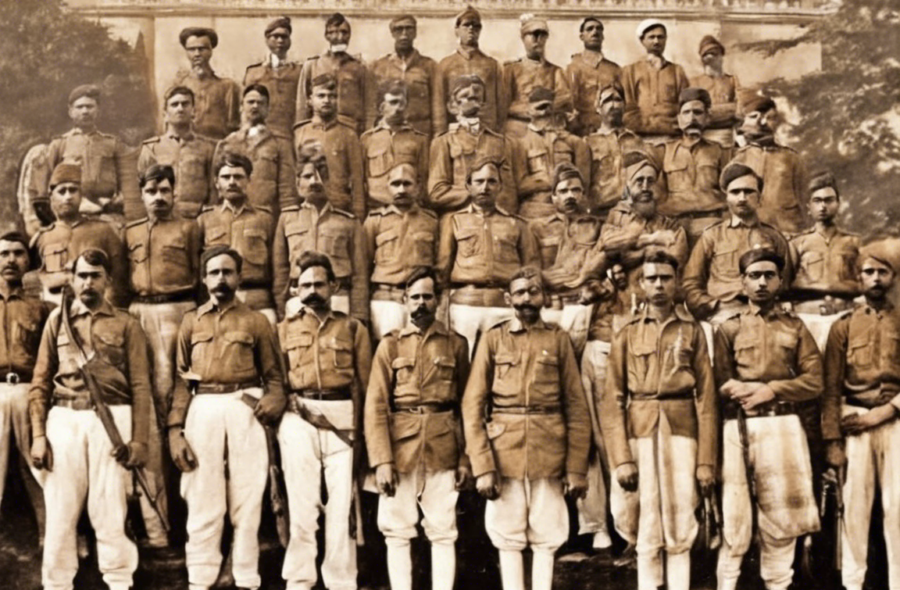The Indian independence movement was a significant period in history that saw countless men and women rise up against British colonial rule to fight for their country’s freedom. These brave souls, often referred to as Indian freedom fighters, played a crucial role in the struggle for independence, sacrificing their lives for the betterment of future generations. Let’s delve deeper into the lives and contributions of some of these unsung heroes.
Early Independence Movements in India
1. The Revolt of 1857
The Revolt of 1857, also known as the Indian Mutiny, marked a turning point in India’s fight against British colonialism. Leaders like Rani Lakshmibai of Jhansi, Mangal Pandey, and Nana Saheb played pivotal roles in this uprising, which ultimately paved the way for the freedom struggle that followed.
2. Bal Gangadhar Tilak
Bal Gangadhar Tilak, popularly known as Lokmanya Tilak, was a prominent nationalist leader who advocated for Swaraj or self-rule. His famous declaration “Swaraj is my birthright, and I shall have it” inspired millions of Indians to join the freedom movement.
Leaders of the Indian Independence Movement
1. Mahatma Gandhi
Mahatma Gandhi, often referred to as the Father of the Nation, led the non-violent civil disobedience movement against British rule. His principles of satyagraha and ahimsa were instrumental in mobilizing the masses and ultimately forcing the British to grant independence to India.
2. Subhas Chandra Bose
Subhas Chandra Bose, also known as Netaji, was a charismatic leader who believed in armed struggle to free India from British imperialism. He formed the Indian National Army (INA) and sought assistance from Nazi Germany and Imperial Japan to fight against the British.
Women Freedom Fighters
1. Sarojini Naidu
Sarojini Naidu, also known as the Nightingale of India, was a prominent poet and activist who played a crucial role in the Indian independence movement. She was the first woman to become the President of the Indian National Congress and was a staunch advocate for women’s rights.
2. Bhikaiji Cama
Bhikaiji Cama was a fearless freedom fighter who is remembered for unfurling the first version of the Indian flag in Stuttgart, Germany, in 1907. She was a key figure in the Indian revolutionary movement and played a significant role in garnering international support for India’s independence.
Unsung Heroes of the Freedom Struggle
1. Chandrashekhar Azad
Chandrashekhar Azad, known for his courage and patriotism, was a fearless revolutionary who played a crucial role in the Kakori conspiracy and several other acts of defiance against the British. He vowed never to be captured alive and lived up to his promise by sacrificing his life for the motherland.
2. Rani Gaidinliu
Rani Gaidinliu, also known as the Rani of the Nagas, was a tribal leader from Manipur who led a revolt against British colonial rule in the northeastern regions of India. She was imprisoned for nearly 14 years but continued to fight for the rights of her people even after independence.
Legacy of Indian Freedom Fighters
The sacrifices and contributions of Indian freedom fighters paved the way for India’s independence in 1947. Their unwavering dedication, courage, and commitment to the cause of freedom continue to inspire generations of Indians to uphold the values of justice, equality, and liberty.
Frequently Asked Questions (FAQs)
1. Who were the major leaders of the Indian independence movement?
- Major leaders of the Indian independence movement include Mahatma Gandhi, Jawaharlal Nehru, Subhas Chandra Bose, Bhagat Singh, and Sardar Vallabhbhai Patel.
2. What role did non-violent resistance play in the freedom struggle?
- Non-violent resistance, as advocated by Mahatma Gandhi, played a significant role in mobilizing the masses and garnering international support for India’s independence.
3. How did the Indian National Army contribute to the freedom struggle?
- The Indian National Army, led by Subhas Chandra Bose, played a crucial role in challenging British colonial rule in India and raising awareness about the fight for independence.
4. What were some key events in the Indian independence movement?
- Key events in the Indian independence movement include the Salt March, the Quit India Movement, the Jallianwala Bagh massacre, and the Chauri Chaura incident.
5. What challenges did women freedom fighters face during the independence struggle?
- Women freedom fighters faced numerous challenges such as societal norms, gender discrimination, and lack of recognition for their contributions to the freedom movement.
As we commemorate the bravery and sacrifices of these remarkable individuals, it is essential to remember the indelible mark they left on India’s history and the enduring spirit of freedom they instilled in the hearts of millions. The legacy of Indian freedom fighters continues to serve as a beacon of hope and inspiration for generations to come.

